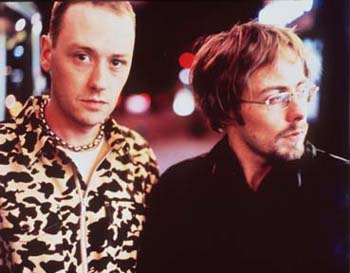![[Metroactive Music]](/music/gifs/music468.gif)
[ Music Index | San Jose | Metroactive Central | Archives ]
Secular Gospel
The Basement Jaxx provide a solid foundation for the future of house music on 'Remedy'
By Michelle Goldberg
THE BASEMENT JAXX'S new album, Remedy (Astralwerks), appears on record-store shelves this month heralded by more hype than any electronic record in history. Spin declared it one of the "90 Greatest Records of the '90s" before it was even released, and nearly every other pop-culture glossy has chimed in with its own raves.
Given all that extravagant praise, one would expect that actually hearing the record would be anticlimactic. But thrillingly, Remedy surpasses its own buzz. It's giddy, manic and magic, a 15-track shot of soulful, propulsive musical ecstasy that will thrill even those who are bored and baffled by most club music.
Remedy is a house record, but it consists of songs, not merely mixable tracks meant to form the building blocks of a DJ set. Though more sophisticated than the big-beat antics of rave & roll stars like Fatboy Slim and the Chemical Brothers, Remedy is similarly full to bursting with killer hooks and grandiose builds.
"Jump N' Shout," for example, combines ragga vocals reminiscent of early jungle tracks with a simple house beat that escalates in intensity until the song itself sounds like it's going to pop. When release finally comes, the rush is almost sexual. "Jump N' Shout" substitutes a rough, dirty bass for the overly polished rhythms of mainstream house, so that it seems suffused with the sweat of a hundred all-nighters.
This song, like much of the album, does something that once seemed impossible: it re-creates for an individual listener the feeling of collective hands-in-the-air abandon that's been the domain of nightclubs and raves.
In recent years, cross-genre hybridization has become incredibly trendy, especially in electronic music. Remedy is especially bold in combining influences, but the disparate elements never feel gimmicky. The album is so exquisitely constructed that the flamenco guitar in "Rendez-Vu" and the Arabic melody buried in "Jump N' Shout" sound inevitable rather than merely exotic.
The brilliant melding of Latin and techno in "Bingo Bango" proves that the Jaxx have a deep feel for international grooves, weaving together salsa rhythms and four-to-the-floor house beats with gleeful naturalness so that the foreign sounds never sound like superfluous spice.
FOR ALL its musical adventuring, though, the band's clearest influences are soul, funk and garage. Indeed, with its insinuating molasses baselines, orgasmic vocals and addictively hummable melodies, Basement Jaxx's clearest antecedent is the Artist, right down to the corny abbreviations in song titles like "U Can't Stop Me," "Being With U" and "Stop 4 Love."
Absurd as it may seem to try to trace the musicology behind such sentiments, there's nothing trite about the amount of bliss packed into these gems. It's become something of a critical commonplace in recent years that drum 'n' bass has superseded house music on the cutting edge because, being darker and more anxiety provoking, drum 'n' bass reflects kids' utterly insecure reality.
Drum 'n' bass is music about flux and instability, while house and techno, with their metronomic heartbeat pulse, are reassuringly regular. When the late-'80s/early-'90s promise of e-fueled dance-floor communion soured, the willful infantilism of rave music and the prefab soul of mainstream house started seeming either cheesy or perverse, and drum 'n' bass, with all its dystopian and military iconography, appeared to be the most honest music of the decade.
As the Basement Jaxx show, though, rapture can be just as real as rupture. At their best, house's joyful lyrics function as a kind of secular gospel, a balm against the cold, hard world.
ORIGINATING IN BLACK, gay clubs in Chicago and New York, house culture is fundamentally escapist, turning the nightclub into a refuge from a harsh and banal reality. Relentlessly positive and hedonistic, house music sounds hopelessly shallow and frivolous when it's bad.
When house music works, though, there's almost a melancholy built into its ecstasy, a sense of snatching a night of heaven out of a system that's seemingly built to deny such pleasure. The feeling is one of dancing on the edge of oblivion--of partying like it's 1999.
This sense, which pervades the Basement Jaxx's music, isn't something verbal--rather, you can hear it in the plaintive note that underlies the defiant happiness of "U Can't Stop Me" or in the melodramatic strings in "Red Alert."
Occasionally, though, the music's bittersweetness is much more explicit, especially on "Always Be There" and on the album's last two songs, "Don't Give Up" and "Being With U." Reminiscent of Hooverphonic, "Always Be There" is almost a ballad. A woman's voice, choked with yearning, soars over an ethereal soundscape of looped strings and synth washes, while the beat pulses lightly beneath.
"Don't Give Up" is the album's one nod toward entropy and dread. Comprised of intricate layers of squelching, gloomy noise forming a stunning counterpoint to a sublimely delicate, scared-sounding chanteuse, "Don't Give Up" would be at home on Tricky's Maxinquaye. The song sounds like someone trying desperately to hold himself together against all odds, with the music occasionally becoming as chaotic as a nervous breakdown before fading again into a charged, ominous background.
Like Massive Attack's "Protection," "Don't Give Up" aches with sympathy for someone about to crack. Most house musicians would never put a song as unsettling as "Don't Give Up" on their albums, but the song serves to deepen Remedy's dominant mood of hard-won jubilation.
After all, joy doesn't mean anything without the contrast of sadness. What makes the seemingly simple sentiments on Remedy so profound is the knowledge that the euphoria can't last, but that doesn't make it any less sweet.
[ San Jose | Metroactive Central | Archives ]
![]()

Underground Sound: Basement Jaxx 'Jump N' Shout' with pure rapture on their exotic new album.
From the August 19-25, 1999 issue of Metro, Silicon Valley's Weekly Newspaper.